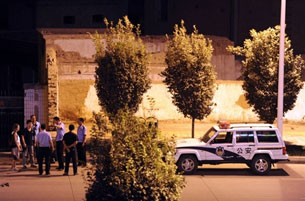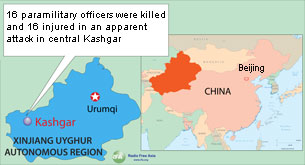 |
|
|
Freedom, Independence and Democracy for East Turkistan ! |
|
|
|
||||||||||
|
|
|
|||||
|
|
|||||
E-mail: etic@uygur.org |
|||||
|
|
||||||||||||||||
|
16 Dead in Xinjiang Attack 2008-08-04 RFADays ahead of the Olympics, assailants reportedly kill 16 paramilitary officers in Xinjiang 
HONG KONG—China’s official media gave divergent
accounts of an attack in the northwestern region
of Xinjiang in which 16 paramilitary people
officers were said to have been killed and 16
injured.
The incident has raised new fears about security surrounding the Olympic Games, which open Friday in Beijing. The official Xinhua news agency said two assailants crashed a dump truck and tossed out two grenades at a paramilitary police station in central Kashgar, an ancient Silk Road town near China’s border with Kyrgyzstan and Tajikistan. Chinese Central Television reported that when armed paramilitary police jogged past the Yi Jing Hotel, near the Kashgar city government office, two men drove a dump truck into them and then threw explosives. Xinhua initially said two trucks were involved but later reported only one. After the truck hit an electrical pole, two assailants jumped out, ignited homemade explosives, and “hacked the policemen with knives,” Xinhua said. An earlier Xinhua report said explosives were tossed at a barracks, but the agency later said the officers’ quarters were 200 yards (meters) away. Other accounts also said the men used a truck bomb. A doctor at Kashgar Prefecture #1 Hospital, contacted by telephone, said only, “They accepted 17 injured people at the hospital.” He refused to elaborate. ‘Separatists’ blamed 
16 paramilitary officers were killed and 16
injured in an apparent attack in central
Kashgar
An employee at a nearby hotel said officials had swiftly cleared the area and business had gone on as usual. “It’s OK now. They cleared up the blast scene already—I’m not worried,” the woman said. But she added, “My colleagues said the scene was really awful…Lots of people rushed over to look and saw lots of police.” Another resident, the owner of a nearby motel, cast doubt on the death toll. “The casualties aren’t that high. I just drove there and had a look,” he said. Xinhua said two assailants had been arrested
but didn’t give details. Chinese officials have previously said extremists among the region’s mostly Muslim ethnic Uyghur population has plotted to carry out terrorist strikes during the Beijing Olympics. Xinhua also said the fatalities were patrol troops from the paramilitary People's Armed Police. “Of course it was absolutely carried out by the East Turkistan pro-independence group,” a government official involved in Olympic security said by telephone, apparently referring to the East Turkestan Islamic Movement (ETIM), which Beijing has labeled a terrorist organization. Asked what steps could be taken to prevent further attacks, he replied, “We have done everything we can.” A duty officer who answered the phone at the Kashgar Public Security Bureau said police there had no details. “We are unable to access into the internet,” the officer said. Public Security Bureau officials in Kashgar declined to discuss the incident. Uyghur-language message boards and Web sites based in China notably lacked any commentary or discussion on the incident. They simply republished official Chinese media accounts. Olympic fears At a news conference in Beijing, Zhou Wangcheng, director of risk management for the Beijing Olympic Games Organizing Committee, cited an ongoing risk of terrorist attacks. “Since the early 1990s, terrorist attacks
have been the number one risk for Olympic
preparations, and we are paying great attention
to this issue,” he said. “The danger of a terrorist attack directed at the Olympic Games has always been there. We have made a comprehensive contingency plan for that.” Tight security Another resident described tight security in the area. “When I came to work this morning, we felt the atmosphere was so tense, because of the explosion. We can go out now, but all the streets are under police guard and people aren’t allowed to move around.” A tour guide from Kashgar said tourists were all on alert. “Sixteen people killed, another 16 injured, they are all armed police. I heard that the suspects have been caught,” the tour guide said. One resident said economic tensions might be to blame. “We have a big gap here between the rich and the poor,” the man, who asked to be identified by his surname, Ma, said. “There are some individuals who are pro-independence. Stability is more important than economy here. The Uyghur people are not hostile to us.” Elsewhere in Xinjiang, security is also tight. “At the airport or on public buses, all bags are subject to security checks,” another man in northern Xinjiang said. “Hundreds of armed police are patrolling the roads. You can’t even throw a piece of paper on the street.” Witnesses describe extremely tight security throughout Beijing and at all Olympic venues, with hotels circulating brochures labeled as Olympic guides and instructions on how what to do in the event of fire or terrorism. In Shenyang, Liaoning province, where some Olympic venues are located, police are guarding 133 parking lots used by city buses at night as well as the city’s 12 major bus terminals. More than 60,000 taxi drivers in Beijing have meanwhile been told to keep vigilant eyes on passengers, while their cabs have been fitted with video cameras and satellite technology that transmits a live audio feed of what’s being said in the cab to a computer for monitoring and linguistic analysis, according to industry sources. Terror links alleged Chinese authorities have consistently described ETIM as a terrorist group with links to al-Qaeda, and the United States has agreed. On July 9, two Uyghurs were executed near Kashgar after being convicted of membership in ETIM. On July 8, police killed five Uyghurs in Urumchi in a raid on an apartment. Official media said they were preparing a “holy war” against China. The Public Security Bureau also announced in April that it had broken up two Uyghur terrorist cells plotting to kidnap foreigners and bomb hotels during the Olympics. It said 45 people were arrested and accused them of ETIM ties. Original reporting by RFA’s Cantonese, Mandarin, and Uyghur services. Cantonese service chief: Shiny Li. Mandarin service chief: Jennifer Chou. Uyghur service chief: Dolkun Kamberi. Edited in English by Sarah Jackson-Han. ... |
 |
|||||
Copyright © www.uygur.org . All rights reserved 20.04.2009 01:42 A. Karakash |
|||||
